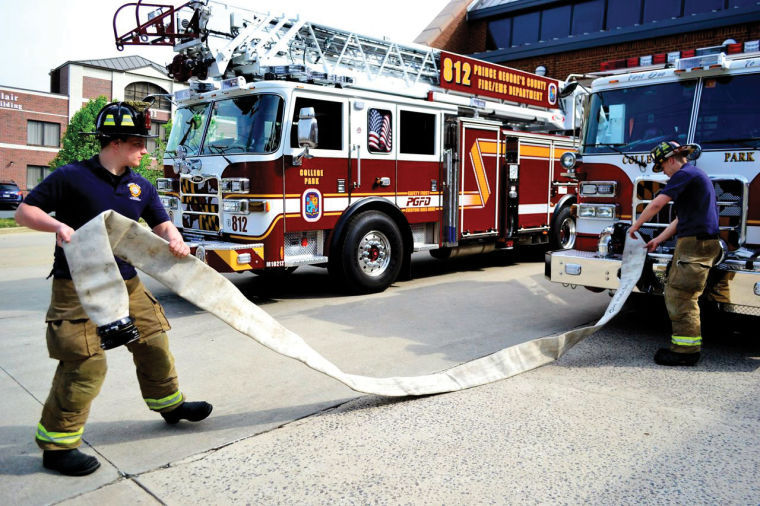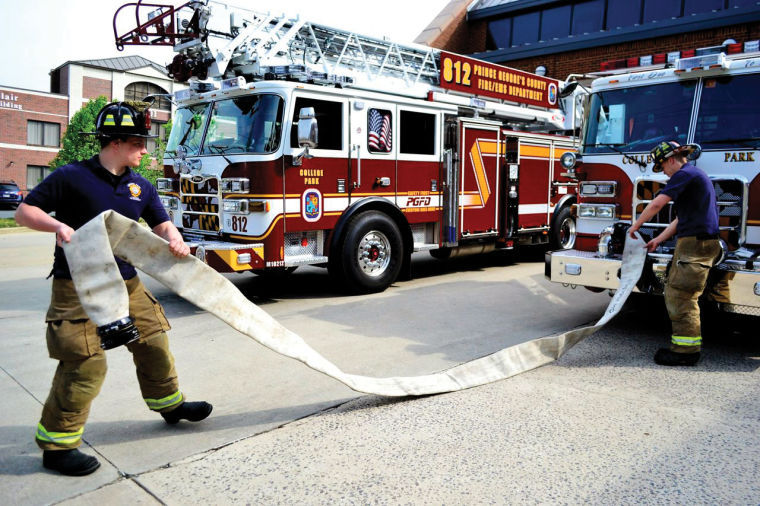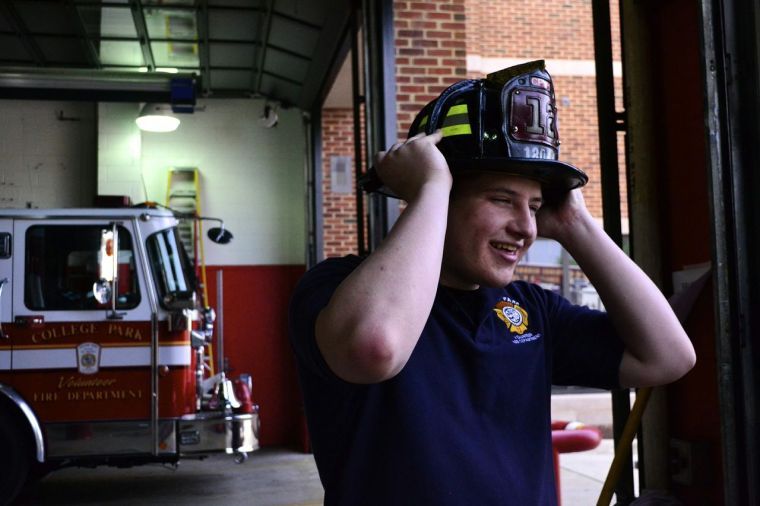Nick Wilbur doesn’t often get a good night’s sleep.
Earsplitting sirens jolt the 22-year-old awake almost every day in the early hours of the morning. And he’s up, throwing off the covers, sprinting out of his room and flying down two flights of stairs. Within 30 seconds, he’s out the door and on the road, the sound of sirens fading away into the distance.
For Wilbur, a student at Prince George’s Community College and University of Maryland University College, this early morning chaos is part of his daily routine as a volunteer firefighter at the College Park Volunteer Fire Department.
“At any point you could be going down the road for a call,” Wilbur said. “There’s some nights where I’ve been up all night, haven’t slept at all, and then have to go to work or have to go to school.
“I love every second of it,” he said.
Wilbur, along with nine University of Maryland students and 11 other men in their early 20s, lives a lifestyle filled with much more responsibility than most people their age shoulder. The 21 men live at the fire station, working about four days a week responding to fires and medical emergencies.
Though the work is unending, demanding and physically and mentally strenuous, the firefighters relish their fun-loving, familial community and said they couldn’t see themselves doing anything else.
In the firehouse’s conference room, volunteer Mark Lee, a junior physiology and neurobiology major, points to a drawing of Route 1 on the whiteboard. The firefighters have to memorize every street.
The drawing shows part of the station’s “first due,” the area of the county that the station has primary responsibility over. It includes this university and much of Route 1 and the surrounding county. The firefighters respond to about five to six calls every day on the campus and about nine to 10 total per day, Wilbur said. They get about 4,500 calls a year — one of the highest numbers in the country, he said.
The guys respond to everything from drunk students, students burning popcorn or getting stuck in elevators, apartment fires, overturned cars on the Capital Beltway to last year’s chemistry building explosion.
“This spring break when everyone left, we didn’t run a call for 24 hours,” Wilbur said. “But a Saturday night, the first day of the semester, when everyone was back, we ran 30 calls in 24 hours. We’ll be out the door every five seconds.”
When the firefighters hear the siren, they “go from sleeping to out the door in 30 seconds,” said Chad Schaefer, a 20-year-old Prince George’s Community College paramedic student.
“In the middle of the night, I’m dead asleep and I wake up to a metro call — in my sleep I know. I throw my covers off and I’m sprinting down,” he said. “I don’t know; it’s weird.”
For a reported fire, firefighters arriving in the engine first find the fire and douse it, Wilbur said. The truck company then arrives with a ladder and its volunteers search for people trapped inside. Others will be on the roof, Wilbur said, cutting holes to get the smoke out and throwing ladders on the building to help firefighters or people inside leave.
“You think it’s such an easy task: Take the water and put it on the fire,” Wilbur said, “Sometimes you go inside and it’s just a maze. There’s no access, or you went in the wrong door, or this door leads to this place.”
While running up to the building, the firefighters have to think at lightning speed, Schaefer said.
“There’s a lot going on,” he said. “You have to see, are there cars in the driveway? Are there toys in the front yard? If there’s cars in the driveway it means there’s someone home. If there’s toys, it means there’s a kid there. You have to look at how many stories it is, what the construction is, where the smoke’s coming from, is it venting already, is the line in place? There’s so much you have to look at in a split second when you’re trying to get your gear on.”
The firefighters must overcome a range of problems, beginning with finding a source of water. It’s a pretty easy job — until the hydrant runs out and they have to find another source, Wilbur said, sometimes 800 feet away.
And feeling around in an unfamiliar house or apartment filled with searing, blinding smoke is almost impossible, he added, especially with gloves that allow for little to no dexterity. Then, because the firefighters’ clothes can only withstand 600 degrees, there’s the chance of getting burned.
The truth is, it’s scary, Wilbur said. “You see rats running downstairs, and you’re running up.”
The “scariest moment” in his life was in December, when a fellow firefighter fell through the roof. Wilbur was on the roof, cutting a hole with two other firefighters. “The smoke cleared a little bit,” and suddenly, there were only two firefighters, Wilbur said.
“I was like ‘ho-ly s—,’” Wilbur said. “We had no idea what was underneath us, whether he went all the way through, whether he went halfway through … For that split second that it takes him to key up his radio and say ‘Hey, I’m okay,’ your heart just drops. You’re like, ‘Please say something.’”
In those situations, they’ll look around at their fellow firefighters. They have to trust in them and themselves, Wilbur said.
“If you don’t know what to do, someone there does,” he said. “Sometimes you’re sitting there like ‘What the hell am I doing?’ We kind of all look at each other with the same face and go do it and figure it out, and at the end you’re like ‘That was cool as s—; we got it.’”
Last Saturday afternoon, at the sudden blaring of a siren, the firefighters were out the door and in the fire truck, six of them crammed in the back facing each other. The truck barreled down the street, entering the campus and stopping in front of Somerset Hall.
A crowd of students stood outside as the firefighters jumped out of the truck, grabbed their gear and ran into the building. Five minutes later, they reemerged. It was an easy call — someone had burnt Velveeta Shells in a first floor common area, the firefighters said.
On their trip home, the firefighters blasted Mumford & Sons on Hot 99.5 and chatted casually.
“Hey dude, wanna grill tonight?” said volunteer firefighter Brian Carbin. “It’s a beautiful day to grill.
“Hopefully it gets interrupted by something good,” he added with a laugh.
Living in doubles “10 inches bigger than a dorm room,” the firefighters have become a family, cooking dinner together on weekends and hanging out with each other in their spare time, Wilbur said. They’re united by their joking, fun-loving personalities that help them deal with their high-stress lifestyles.
For instance, the firefighters often have to respond to heart attack victims or dead people, such as the student found dead in Commons 3 last semester.
And sometimes the calls are personal: Once, one of their medics went to high school with a police officer who wrecked his car on the University Boulevard bridge on Route 1. The medic was treating the officer, and he ended up dying, Wilbur said.
In those cases, Wilbur said the firefighters can’t let themselves get personally involved in the situation.
“That’s why we all hang out with each other, have fun and kind of joke around about stupid stuff; it’s just the way we cope with stuff like that,” he said.
And since working as a firefighter doesn’t pay, the guys have to balance school and part-time jobs with volunteering at the station. They also plan fundraisers for the station, like the golf tournament they’re holding at Beltsville’s Cross Creek Golf Club tomorrow.
But on Saturday, the guys didn’t appear stressed over their demanding lifestyles. The firefighters lounged in the kitchen, eating candy and polling whether to have tater tots or fries for dinner.
“Do you want dinner?” Carbin said over the firehouse intercom. “We’re going to be doing some grilling, some burgers, sausages, peppers and onions — it’s a beautiful day.”
They laughed over a plastic toy chicken that lays gum eggs, part of one firefighter’s Easter care package from his family.
He wasn’t going home for Easter. For the most part,Wilbur said, the firefighters don’t leave for holidays.
Growing up with a firefighting father, Wilbur said Christmas Eve was the big holiday for his family; he’d open his presents and then his father would drive to work at 2 a.m. Christmas Day because firefighting doesn’t stop during the holidays. If anything, there are more fires, Wilbur said, because of Christmas lights and people cooking who normally stay away from the stove.
Late afternoon on Saturday, Wilbur walked down a hallway lit by red lights, pointing out the firefighters’ rooms, each uniquely decorated. One firefighter, Lee, has an aquarium, and another is moving out at the end of the semester.
“But we have 15 prospective members now,” he said, walking casually. “They’re going to come down and try to move in. So we’ll probably have about six or seven—”
But he didn’t finish his sentence. An earsplitting siren — an all-too-familiar sound — rang, and Wilbur sprang into action, hopped over the gate blocking the fire pole and flew down the pole. Within 10 seconds, he was out the door and gone, the fire truck screaming down the street.
And it wasn’t anything unusual — just the daily routine for the student firefighters of Station 12. No matter where they are or what they’re doing, these 21 men vow they’ll drop everything to risk their lives for others.
In truth, they’re just a “bunch of young kids with a lot of responsibility,” Wilbur said.
“We work, do laundry … We run calls, risk our lives together,” he said.
Despite the dangers, the difficulties and sometimes, the failures, their motto is “adapt and overcome,” keeping in mind that eventually, all fires will go out.
“That’s the one thing we’ve learned,” Wilbur said. “You can never burn a hole in the sky.”
newsumdbk@gmail.com





